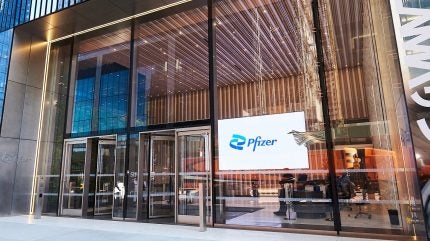
Pfizer’s Phase III CREST trial evaluating sasanlimab with Bacillus Calmette-Guérin (BCG), as induction treatment with or without maintenance in subjects with BCG-naïve, high-risk non-muscle invasive bladder cancer (NMIBC), has met its primary endpoint of event-free survival (EFS).
The trial showed a ‘clinically meaningful’ and ‘statistically significant’ improvement when treated with therapy plus BCG, compared to BCG alone.

Discover B2B Marketing That Performs
Combine business intelligence and editorial excellence to reach engaged professionals across 36 leading media platforms.
The company noted that the safety profile of therapy plus BCG was said to be ‘generally consistent’ with the known effects of BCG along with data from trials involving the therapy.
It is currently preparing to discuss these outcomes with worldwide health authorities, which could support potential regulatory filings.
It is also investigating sasanlimab in conjunction with its antibody-drug conjugate portfolio for advanced solid tumours.
Pfizer chief oncology officer Roger Dansey said: “The initial therapy of high-risk, non-muscle invasive bladder cancer with BCG has not advanced in decades. Today’s pivotal Phase III CREST results are potentially practice-changing, representing the first advance in therapy for BCG-naïve, high-risk, non-muscle invasive cancer in over 30 years.

US Tariffs are shifting - will you react or anticipate?
Don’t let policy changes catch you off guard. Stay proactive with real-time data and expert analysis.
By GlobalData“These results reinforce Pfizer’s leadership in genitourinary cancer research and development, demonstrating our ongoing commitment to deliver new treatment options for patients with bladder cancer.”
A humanised immunoglobulin G4 monoclonal antibody, sasanlimab works by binding to the programmed death-1 (PD-1) receptor, blocking its interaction with PD-L1/PD-L2.
Approximately 100,000 individuals are diagnosed with high-risk NMIBC globally each year. The standard care for these patients for decades has been induction therapy with BCG followed by maintenance.
Last month, Pfizer and Arvinas released preliminary outcomes from the Phase Ib segment of the TACTIVE-U sub-trial.
This trial is exploring the combination of vepdegestrant and abemaciclib in treating locally advanced or metastatic, oestrogen receptor-positive, human epidermal growth factor receptor 2 negative breast cancer.





